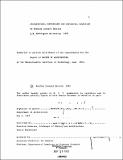Architectural conventions and contextual cognition
Author(s)
Shotola, Bradley Leonard
DownloadFull printable version (40.77Mb)
Other Contributors
Massachusetts Institute of Technology. Dept. of Architecture.
Advisor
Stanford Anderson.
Terms of use
Metadata
Show full item recordAbstract
What is offered herein are some tools of architectural criticism. The focus of these criticisms is concerned with the environmentally-public edge between individual buildings and their site-specific contexts. Within such a domain, the particular interest of this investigation pertains to the formal manifestations of convention in architecture; and seeks to characterize some of the cognitive effects of convention, in the built contexts of contemporary communities. Such an inquiry, into the 'meeting places' of architectural environments and their concordant contextual understandings, is not intended to provide new and revolutionary discoveries of this realm; merely critically-characterize its apparent manifestations. The method of this investigation asserts 'positional' understandings of this realm, and seeks their domain of critical service by testing these positions against external evidence of documented performance. In doing so, this thesis 'reconstructs' investigative criticism, of the built environment, in the spirit of a 'research program'. (Imre Lakatos 1963, 1971) Investigation proceeds from perceptual and socio-historic aspects of convention in architecture; to a critical position, less concerned with convention's objective significance, than an attendance to architectural convention as an environmental baseline for evaluating contemporary change. This view holds the familiar contexts of our everyday lives as a framework of developmentally-normative environmental understanding; and sides with the inhabitants of these contexts, who see their local neighbor hoods as home, not as abstract formal settings. Perceptual criticisms the formal manifestations of convention in architectural contexts, seems to enforce a kind of site-specific gestalt of contextually-interactive groupings. A collective datum, constructing a phenomenal ground of conventionally-preferred performance, against which the 'differentness' of our intervening buildings will be judged. Cognitive 'maintenance', of such a developmental aspect of architectural convention in contexts, can be thought of as a socially-interactive faculty; comparing familiar roles of one's own community's conventionalized formal postures, with the new supports provided (or imposed) by the more recent element of change. This thesis seeks to blur the professional conception, of creativity residing solely in inventive originality. Such a notion tends to encourage contextually unfortunate extrapolations; with the most creative works receiving professional acclaim , precisely because of its unconventionality. The persistent emphasis on the heroics of professional concepts over cultural ones additionally tends to manifest an evaporation of urban fabric, as well as, an importantly local sense of a community's developmental history. The marvelous intuition of the diagram should be reformulated in the terms of the environment in which it will interact. This is to say that the support our professional interventions supply, no matter how attractive on their own, should be reconsidered at the conventional level of performance, which the context offers to a similar need. Such a framing of architectural criticism in service of its context, does not mean to limit the intellectual capacity of the profession: it merely seeks to demonstrate socially-developmental cognitions of context, as an important creative source. Experiential understanding of our architectural ideas, formal or programmatic, may be very weak if our contextual positions appear too smug: astonishingly strong if our change is measured and cognizant of its contextual posture. Convention does not usurp creatively, it merely characterizes a developmental level of normative environmental performance; and through such norms, lends understanding and accommodation of environmental change.
Description
Thesis (M. Arch.)--Massachusetts Institute of Technology, Dept. of Architecture, 1983. MICROFICHE COPY AVAILABLE IN ARCHIVES AND ROTCH Includes bibliographical references (p. 251-257).
Date issued
1983Department
Massachusetts Institute of Technology. Department of ArchitecturePublisher
Massachusetts Institute of Technology
Keywords
Architecture.